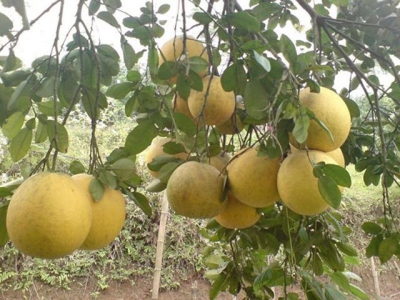Phu Tho develops 50 products under OCOP programme

Phu Tho – The northern province of Phu Tho will develop about 50 products under the local One Commune-One Product (OCOP) programme, according to the province’s implementation plan for the programme until 2020.
Doan Hung pomelo, a specialty of Phu Tho province (Photo: thixaphutho)
Accordingly, Phu Tho aims to have at least five products to be ranked at provincial level and one at national level, along with at least 50 local economic establishments joining the OCOP programme.
This year, the province will invest in 23 key products, notably Doan Hung pomelo, high quality J02 rice, Hung Lo rice noodle, Y Son orange and green tea, among others.
It will continue to select at least 27 potential products to join the OCOP programme in 2020.
The province has mobilised 19 billion VND (about 820,000 USD) for the programme and set up a network to manage its implementation at all levels.
Phu Tho will work to raise public awareness of the programme and develop pilot models to assist with the development of value chains for target products in combination with local craft villages, while increasing trade promotion activities to boost the sale of local specialties in trade fairs at home and nationwide.
The province, known as Vietnam’s ancestral land, is home to 75 recognised craft villages, while more 500 other villages engage in the production of certain products. However, the production scale is often small, and product supply is yet to meet market demand.
Additionally, Phu Tho will team up with other localities to boost consumption of its products and encourage the application of science-technology and intellectual property protection.
The OCOP was initiated by the Ministry of Agriculture and Rural Development in 2008, following the model of Japan’s “One Village, One Product” (OVOP) drive and Thailand’s “One Town, One Product” (OTOP). It is an economic development programme for rural areas focusing on increasing internal power and values, contributing to the implementation of the National Target Programme on New Rural Development for 2016-2020.
Related news
 Fruit, vegetable exports fall 5.8 percent in eight months
Fruit, vegetable exports fall 5.8 percent in eight months Fruit and vegetable exports in the first eight months of this year fell by 5.8 percent year on year to about 2.53 billion USD
 Good news for Vietnam's cashew industry
Good news for Vietnam's cashew industry Instead of competing fiercely with each other, cashew companies have now joined hands to boost exports and focus on deep processing to obtain higher added value
 Rice importers’ strict requirements discourage local firms
Rice importers’ strict requirements discourage local firms A number of rice importers have imposed an array of strict requirements, discouraging local rice firms from continuing to operate.